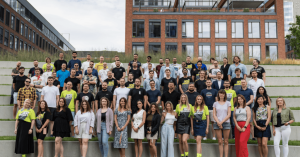Last month Augment, the Bulgarian gaming startup, officially announced their project with Riot Games, the largest game publisher in the world and the creators of League of Legends, which boasts over 120 million players every month. The data-analytics platform of Augment, which helps solve game data limitations with the help of machine learning is being utilized by the broadcasting teams of the latest franchise of Riot Games, VALORANT.
Since its launch in 2020, the eSports startup has closed a pre-seed round from Vitosha Venture Partners, raised €150K from BrighCap Ventures, and participated in the Spring 2022 cohort of the Bulgaria Innovation Hub accelerator program.
“When it comes to the competitive gaming sector, no other company comes close to the level of adoption that Riot Games has achieved with their games. Our software was initially developed for professional eSports teams, and Riot themselves reached out to us because of the innovations we brought to VALORANT. They saw a great use case for our software to educate their player base about the intricate events in the game with the help of visualization and data instead of using the traditional telestrator seen in standard sports broadcasts. Unlike other eSports franchises, about 60% of the viewers of Riot Games’ tournaments are watching the streams in order to improve their gameplay, with our expertise in working with pro teams we have built the ideal products to convey the high-level decision-making pro eSports players make” Tim Petrov, CEO of Augment shares for The Recursive.
The VALORANT Champions Tour Europe introduced an improved segment using the telestrator product, provided by Augment. “This feature allows players to delve deeper into the tactics employed by the top teams in our region when playing VALORANT. The telestrator is currently available for VALORANT eSports in the EMEA (Europe, Middle East, and Africa) region. It enables the expert commentators to replay crucial moments in the matches, emphasize the most significant events, and analyze the strategic decisions that separate good teams from exceptional ones,” Tim Petrov explains.
The ML gaming platform of Augment
In addition to the telestrator’s capabilities, Augment has varieties of integrations to enable publishers and game app developers to extract and use valuable game data. The tech built by Augment enables both B2B and B2C oriented companies to build products with established game franchises.
“Augment leverages machine learning to solve game data limitations. Our product works with existing game data and enriches it via machine learning to deliver a variety of products and development tools,” Tim Petrov points out.
A telestrator is a tool commonly used in sports broadcasting to enhance the analysis and explanation of game strategies and plays. It is essentially a touchscreen device or software application that allows broadcasters to draw or annotate live or recorded video footage.
In the context of gaming and eSports, a telestrator serves a similar purpose. It enables commentators and analysts to illustrate and break down specific moments, tactics, and decisions made by players during a match. By using the telestrator, they can draw lines, circles, or other graphical elements directly on the screen to highlight important areas or movements, providing viewers with a clearer understanding of the gameplay.
For example, in VALORANT, the telestrator can be used to showcase the path taken by a player during a round, mark the positions of teammates or opponents, or emphasize the tactical positioning of players during a critical moment. This visual aid helps viewers, particularly those less familiar with the game, to follow and comprehend the strategic elements of the gameplay.
The transformations of the eSports industry
According to Tim Petrov, the eSports industry is undergoing a transformative shift, with the business model aligning more closely with that of the gaming industry rather than traditional sports.
One of the distinguishing factors of eSports is its ability to connect with the most valuable demographic groups globally: Millennials, Generation Z, and the emerging Alphas. However, the eSports business model still faces challenges compared to traditional sports, particularly in terms of broadcast licensing revenues.
While traditional sports leagues generate billions of dollars through licensing deals with linear television networks and more flexibility with sponsorship opportunities, eSports encounters an audience mismatch on these platforms. Most eSports viewers are not tuned in to traditional sports channels like ESPN or FOX Sports; instead, they primarily consume content from streamers on platforms like Twitch and YouTube. As a result, eSports content fails to reach traditional sports viewers, unless it involves a simulated traditional sport like NBA2K.
Fortunately, eSports possesses a significant advantage over traditional sports—the direct connection to viewers and their ability to stream on their own watch platforms by using Twitch or YouTube video players.







